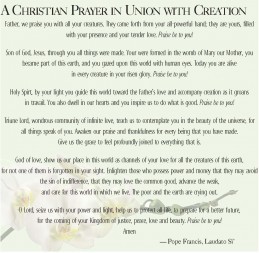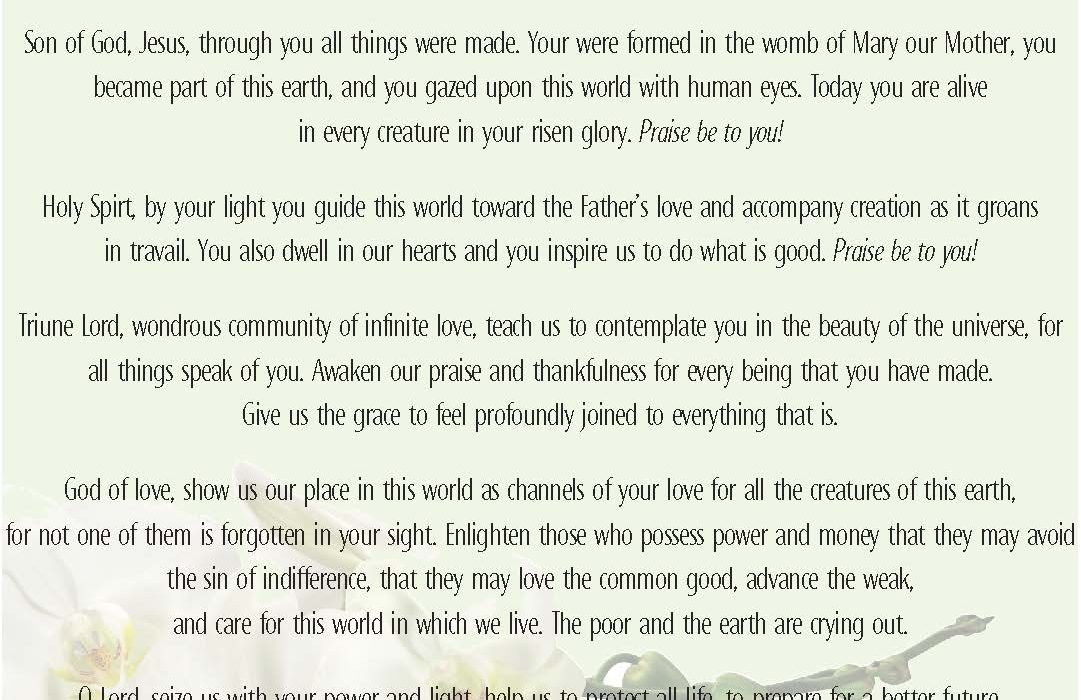June 23, 2015 // Uncategorized
The pope’s call to care for our common home
 I was on retreat with our priests at Pokagon State Park when the new encyclical of Pope Francis was released. It is entitled Laudato Si: On Care For Our Common Home. The title comes from the Canticle of the Sun, by Saint Francis of Assisi. Saint Francis praises God our Creator for the sun, the moon, the earth, and all creation. I read the encyclical surrounded by the beauty of the state park: the lake, the trees, the wildlife, and plants. It was a perfect locale to reflect on a document about the environment.
I was on retreat with our priests at Pokagon State Park when the new encyclical of Pope Francis was released. It is entitled Laudato Si: On Care For Our Common Home. The title comes from the Canticle of the Sun, by Saint Francis of Assisi. Saint Francis praises God our Creator for the sun, the moon, the earth, and all creation. I read the encyclical surrounded by the beauty of the state park: the lake, the trees, the wildlife, and plants. It was a perfect locale to reflect on a document about the environment.
I encourage everyone to read this important encyclical letter of our Holy Father. It has captured the world’s attention, as well it should, since it deals with matters very important for the present and the future of humanity. Pope Francis expresses his grave concern about the harm that has been inflicted upon the earth by “our irresponsible use and abuse of the goods with which God has endowed her.” He writes about the deterioration of the global environment. Building on the teaching of his predecessors, Pope Saint John Paul II and Pope Benedict XVI, Pope Francis brings new urgency to the need to respect the natural environment and to protect our common home. The Holy Father is appealing to everyone, not just Catholics, to address the immense challenge of preserving our planet for future generations.
I don’t know how often we have considered the issue of ecology from the perspective of our faith, yet it is an integral part of our faith. We profess that God is the Creator of the heavens and the earth. Our responsibility toward our Creator includes our stewardship of nature and creation. Pope Francis writes rather bluntly: “We are not God. The earth was here before us and it has been given to us.” The Pope explains that the Genesis account of man’s dominion over the earth does not mean domination. He writes: “we must forcefully reject the notion that our being created in God’s image and given dominion over the earth justifies absolute domination over other creatures.”
Pope Francis reminds us of the words of the book of Genesis: “The Lord God took the man and put him in the garden of Eden to till it and keep it (2:15)”. The Holy Father writes: “‘Tilling’ refers to cultivating, ploughing or working, while ‘keeping’ means caring, protecting, overseeing and preserving. This implies a relationship of mutual responsibility between human beings and nature. Each community can take from the bounty of the earth whatever it needs for subsistence, but it also has the duty to protect the earth and to ensure its fruitfulness for coming generations.”
Our responsibility for the care of the earth is part of our faith. We are to use the goods of the earth responsibly. We should be deeply concerned about the depletion of the natural resources of the earth, air and water pollution, and loss of biodiversity. We should be concerned about the harmful effects of global warming, which most scientists attribute largely to greenhouse gases. Pope Francis writes: “Climate change is a global problem with grave implications: environmental, social, economic, political and for the distribution of goods. It represents one of the principal challenges facing humanity in our day.”
We have a moral responsibility toward creation, a responsibility we must assert in the public sphere. This is about protecting God’s creation: the earth, water, and air. This is also about protecting human life, what the Popes have called “human ecology.” The deterioration of nature impacts human life and well-being. Our duties toward the environment are linked to our duties toward the human person. Pope Francis writes: “Human beings too are creatures of this world, enjoying a right to life and happiness, and endowed with unique dignity. So we cannot fail to consider the effects on people’s lives of environmental deterioration, current models of development and the throwaway culture.” The Pope highlights how those most harmed by environmental degradation are the poor.
I am just highlighting in this column a few of the many points covered in Laudato Si. Again, I encourage you to read the encyclical in its entirety, to study it, and to prayerfully reflect on it. A global response is needed to the difficult challenges we face. Pope Francis is calling for public action on every level: local, national, and international. The Church has a duty to speak out in the public square. We are facing an ecological crisis. Too often, self-interest or political ideology can get in the way of progress in addressing this crisis. Pope Francis is challenging us to move forward together with a strong commitment to care for our common home today so that it will be a healthy home for future generations. This is not just a social or political issue. It is a spiritual and moral issue.
Laudato Si is a call to conversion for all of us, a call to care better for God’s creation. It’s a call to reject consumerism and a “throwaway culture” that drives so many of our environmental problems. Pope Francis is calling us to examine our own lifestyles, for example, how we so often waste food and energy. Small everyday actions matter, like turning off unnecessary lights, recycling, planting trees, etc. The Holy Father is calling us to personal spiritual conversion, to live rightly within the world we live in, and to witness to our faith that creation is God’s gift to humanity, a gift that needs protection.
Following the example of Saint Francis of Assisi and assisted by his intercession, may we praise and serve God by respecting the beauty and goodness of creation! May we be responsible guardians of creation, working together to protect our common home!
The best news. Delivered to your inbox.
Subscribe to our mailing list today.






